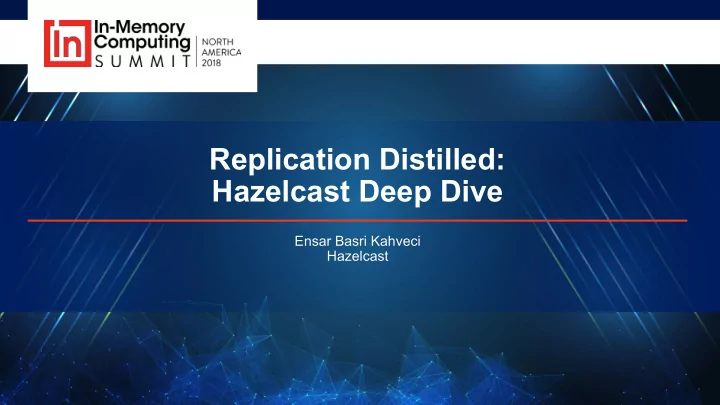

Replication Distilled: Hazelcast Deep Dive Ensar Basri Kahveci Hazelcast
Hazelcast ▪ The leading open source Java IMDG ▪ Distributed Java collections, concurrency primitives, ... ▪ Distributed computations, messaging, ...
In-Memory Data Grids ▪ Distributed caching ▪ Keeping data in local JVM for fast access & processing ▪ Elasticity, availability, high throughput, and low latency ▪ Multiple copies of data to tolerate failures
Replication ▪ Putting a data set into multiple nodes ▪ Fault tolerance ▪ Latency ▪ Throughput
Challenges ▪ Where to perform reads & writes? ▪ How to keep replicas sync? ▪ How to handle concurrent reads & writes? ▪ How to handle failures?
CAP Principle ▪ Pick two of C , A , and P ▪ CP versus AP
CP
AP
Consistency/Latency Trade-off
Consistency/Latency Trade-off
PACELC Principle ▪ If there is a network partition (P) , we have to choose between availability and consistency (AC) . ▪ Else (E) , during normal operation, we can choose between latency and consistency (LC) .
Let’s build the core replication protocol of Hazelcast
Primary Copy ▪ Operations are sent to primary replicas. ▪ Strong consistency when the primary is reachable.
Partitioning (Sharding) ▪ Partitioning helps to scale primaries. ▪ A primary replica is elected for each partition.
Updating Replicas
Updating Replicas partition id = hash(serialize(key)) % partition count
Updating Replicas
Updating Replicas
Async Replication ▪ Each replica is updated separately. ▪ High throughput and availability
Anti-Entropy ▪ Backup replicas can fall behind the primary. ▪ Non-sync backups are fixed with an active anti-entropy mechanism.
Replicas are not sync ▪ The client reads a key from the current primary replica.
Network Partitioning ▪ The client reads the same key.
Split-Brain ▪ Strong consistency is lost.
Resolving the Divergence ▪ Merge policies: higher hits, latest update / access, … ▪ Merging may cause lost updates.
Let’s classify this protocol with PACELC
Hazelcast is PA/EC ▪ Consistency is usually traded to availability and latency together. ▪ Hazelcast works in memory and mostly used in a single computing cluster. ▪ Consistency - latency trade-off is minimal. ▪ PA/EC works fine for distributed caching.
Favoring Latency (PA/EL)
Scaling Reads ▪ Reads can be served locally from near caches and backup replicas.
Favoring Consistency (PC/EC)
Failure Detectors ▪ Local failure detectors rely on timeouts. ▪ Operations are blocked after the cluster size falls below a threshold.
Failure Detectors ▪ It takes some time to detect an unresponsive node. ▪ Minimizes divergence and maintains the baseline consistency.
Isolated Failure Detectors ▪ Configure failure detectors independently for data structures ▪ Phi-Accrual Failure Detector
CP Data Structures ▪ IDGenerator ▪ Distributed impls of java.util.concurrent.* ▪ PA/EC is not the perfect fit for CP data structures.
Flake IDs ▪ Local unique id generation ▪ Nodes get a unique node id during join. ▪ K-ordered IDs
CRDTs ▪ CRDTs: Conflict-free Replicated Data Types ▪ Replicas are updated concurrently without coordination. ▪ Strong eventual consistency ▪ Counters, sets, maps, graphs, ...
PN-Counter
PN-Counter
Sync Replication ▪ Concurrency primitives imply the true CP behavior. ▪ Paxos, Raft, ZAB, VR ▪ Re-implementing Hazelcast concurrency primitives with Raft
Recap ▪ http://bit.ly/hazelcast-replication-consistency ▪ http://bit.ly/hazelcast-network-partitions ▪ http://dbmsmusings.blogspot.com/2017/10/hazelcast-an d-mythical-paec-system.html
Thanks! You can find me at ▪ @metanet ▪ ebkahveci@gmail.com
Recommend
More recommend